Birtwistle: The Minotaur
Introduction
Harrison Birtwistle's (and indeed David Harsent's) latest foray into mythological opera was only premiered this year, and here we have the results of that rather fantastic collaboration between one of the world's greatest living composers and greatest opera companies.
The basis of the plot, as it is, revolves around Theseus's quest to kill the Minotaur of Crete, and Ariadne's confused state of being as to whether she should be protecting her half-brother, the Minotaur (the result of a less-than-Romantic pairing between Ariadne's mother and the bull of the sea).
Ariadne feels trapped between trying to protect her half-and-half relation, and escaping the existence she has on Crete, which involves, amongst other things, forcing young men and women from Athens into the Labyrinth to become blood offerings.
Theseus arrives with the latest batch of sacrificial lambs, intent on killing the Minotaur, or dying in the attempt. Ariadne sees something special in this man, and there may be a way out.
Meanwhile, the Minotaur himself, who is actually called Asterios, yet cannot speak his name, or anything else for that matter unless he is dreaming (or dying), has his own issues....
Audio
A quite superb DTS sound, and one of the best I've heard from an Opus Arte disc, carries the full force of Birtwistle's massive orchestra, and yet produces a perfect balance between that, the soloists and the chorus.
Video
Exemplary quality, with the added advantage of getting 'up close and personal' to the action with no problems in focus or issues with darker scenes.
Extras
Quite disappointing really. The c.30 minute 'Myth is Universal' consists of the usual suspects discussing the genesis and development of the opera, but then doesn't involve John Tomlinson himself, or indeed show any rehearsal footage - things I would have loved to have got my teeth into.
We do learn quite a bit however, but the whole thing feels like 'Part 1' of something that could have been much more. Considering the recent Salome had a whole South Bank Show dedicated to it, I can't help but feel somewhat underwhelmed and short-changed.
Some additional amusement may be had by counting the amount of times David Harsent says 'um' while being interviewed though, so all is not lost.
..and of course a useful Illustrated Synopsis and Cast Gallery which really needs to do a bit more to raise some excitement as a DVD extra.
Conclusion
I've been familiar with Birtwistle's music for a long time, and was bowled over by his earlier forays into music theatre when I first heared Punch and Judy in my early teens. Following that, masterpeices such as Earth Dances, The Triumph of Time, The Mask of Orpheus, and Panic (the piece that really annoyed people when it was played at the Last Night of the Proms) have all made their mark in different ways, yet here, things seemed to have calmed down a bit. It's all actually quite 'listenable to' in a funny way, and none the worse for it.
Birtwistle says that there is a line of music running throughout the work (but we needn't be too concerned about it ourselves, as it's more of a 'private' thing, apparently) and this gives everything a sense of cohesion. And indeed it does.
The huge orchestra is used expertly, not just with full forces throughout, but with incredible subtlety and beauty in many areas (notable cembalom and saxophone writing stand out). Added to this, the vocal lines go to extremes yet seem perfectly natural, even when John Tomlinson howls like the beast he is (describing the character he plays, of course). His role also shows the greatest amount of humanity out of all the characters, despite being a 'monster', and so draws the greatest amount of sympathy from the audience.
All the singers are superb however, but Christine Rice as Ariadne stands out as something really special. Johan Reuter (Theseus) is also excellent, but sometimes his pronounciation stands out like a sore thumb - but as he's playing a Greek mythological character, we can perhaps suspend a bit of disbelief.
Andrew Watts, as the 'Snake Preistess' (a form of Oracle, bare-breasted and all!) is a revelation, and the same may be said of the rest of the cast, including the chorus, who have some frighteningly difficult music to sing.
Antonio Pappano and the band do a stirling job with the music. The playing is tight and exciting, and a great demonstration as to why the orchestra of the Royal Opera House is rightly considered one of the best in the world.
The DVD cover includes a warning about 'Scenes of violence and of a sexual nature' . This is an apt notice, as maybe some do not want to be confronted by scenes of rape by a half-human/ half-bull, but again, being a mythological subject, sometimes even books for children may contain similar themes, although perhaps not so graphic.
The camera angles betray some of the bloodthirsty tricks, but this doesn't lessen the power of the more shocking scenes.
Overall, this is a quite extraordinary work, and I hope the production will be revived soon. Despite a lacklustre set of extras, the DVD gets full marks.
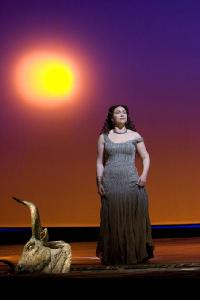
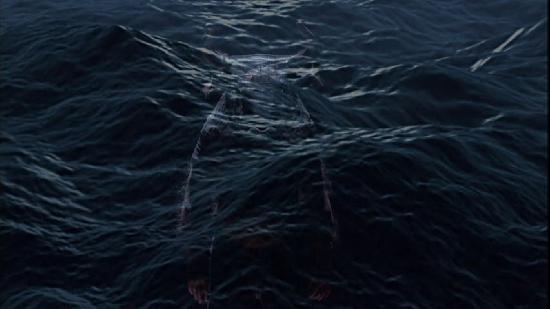
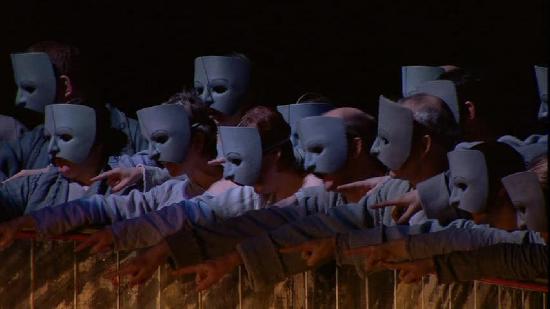
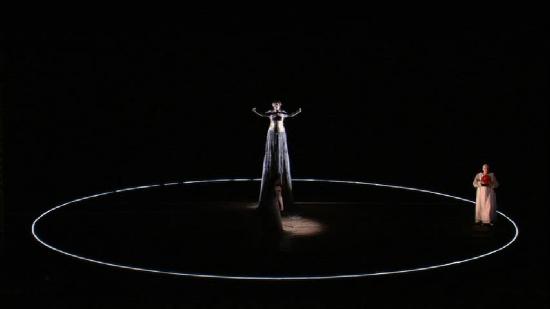
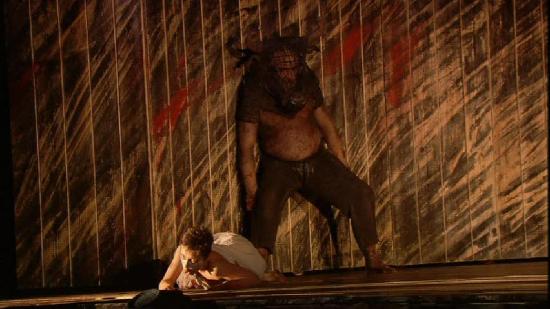
Your Opinions and Comments
Be the first to post a comment!